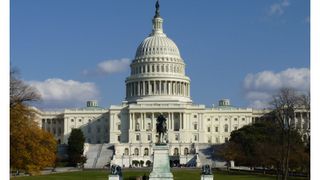Sens: Trump Administration Lacks Coherent 5G Strategy

Bipartisan Senate leadership has called on the Trump Administration to name a senior coordinator for the effort to deploy 5G, saying the Administration lacks a "coherent" strategy, including on addressing the threat from Chinese technology.
The Administration has said that winning the race to 5G a national priority.
That call for a 5G czar came in a letter to National Security Adviser Robert O’Brien from the chairs and ranking members of the Intelligence Committee, Homeland Security and Governmental Affairs Committee, the Foreign Relations Committee, and the Armed Services Committee.
“While we appreciate the progress being made within and across departments and agencies, we are concerned that their respective approaches are not informed by a coherent national strategy," they wrote. They said the current approach comprises a diverse coalition of shared concern rather than coordinated activity.
They want the President to appoint a "dedicated, senior individual focused solely on coordinating and leading the nation’s effort to develop and deploy future telecommunications technologies," and said that is particularly important after the Administration's move last week to phase out the emerging technologies director at the National Security Council.
"Without a national strategy, facilitated by a common understanding of the geopolitical and technical impact of 5G and future telecommunications advancements, we expect each agency will continue to operate within its own mandate, rather than identifying national authority and policy deficiencies that do not neatly fall into a single department or agency," they wrote. "This fractured approach will not be sufficient to rise to the challenge the country faces."
One of the big challenges, they suggested, was the current use of Chinese tech in U.S. networks. "China’s leadership, combined with the United States’ increased reliance on high-speed, reliable telecommunications services to facilitate both commerce and defense, poses a strategic risk for the country."
Broadcasting & Cable Newsletter
The smarter way to stay on top of broadcasting and cable industry. Sign up below
The Trump Administration has said it agrees Chinese telecom Huawei is a national security threat, but also this week renewed the license of U.S. companies to supply tech to Huawei, citing the continued reliance of smaller telecom on Huawei in their networks.
The "they" doing the writing were Sens. Mark R. Warner (D-Va.) and Richard Burr (R-N.C.), vice chairman and chairman, respectively, of the Intelligence Committee; Sens. Ron Johnson (R-Wis.) and Gary Peters (D-Mich.), chairman and ranking member, respectively, of the Homeland Security and Governmental Affairs Committee; Sens. Jim Risch (R-Idaho) and Bob Menendez (D-N.J.), the chairman and ranking member, respectively, of the Foreign Relations Committee; and Sens. Jim Inhofe (R-Okla.) and Jack Reed (D-R.I.), chairman and ranking member, respectively, of the Armed Services Committee.
Contributing editor John Eggerton has been an editor and/or writer on media regulation, legislation and policy for over four decades, including covering the FCC, FTC, Congress, the major media trade associations, and the federal courts. In addition to Multichannel News and Broadcasting + Cable, his work has appeared in Radio World, TV Technology, TV Fax, This Week in Consumer Electronics, Variety and the Encyclopedia Britannica.

